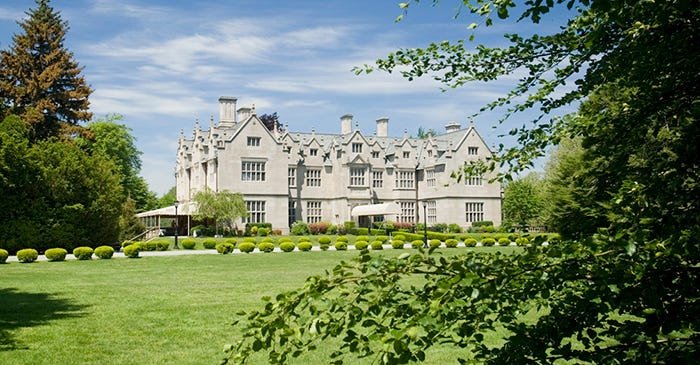
Louise Astor Van Alen Saunderson was a Santa Barbara socialite and heiress: she was born in May 10, 1910, the daughter of James L. Van Alen and Margaret “Daisy” Post.
If you aren’t subscribed yet, hit the subscribe button below to receive the Adorable Stories every weekend, directly in your inbox:
Her mother, Daisy, was a descendant of the Vanderbilt family and became one of Newport’s last “Gilded Age” matrons.
Her father, James L. Van Alen, was a wealthy millionaire, heir of the legendary Astor family: he was a descendant of John Jacob Astor, a German-born American businessman, merchant, real estate mogul, and founder of the American Fur Company.
Louise grew up lavishly at the imperious Van Alen estate “Wakehurst”, in Newport, Rhode Island: Louise was rebellious and liked to do the opposite of whatever her mother said. On the death of her father, in 1923, she inherited close to USD 2 million.
Growing up as a girl in Newport, Louise was surrounded by wealth and was known for her wit, charm and beauty and she regularly appeared at Bailey’s Beach for a swim.
Enter the Mdivanis
The sources are cloudy at best.
The Mdivanis (Georgian: მდივანი) were apparently a noble family from Tbilisi, dating back to at least the XVIII century: Mdivani means “Secretary” in Georgian, but the family claimed their name derived from the Persian phrase for “sitting on a divan.”
The Mdivani family claimed to be princes that had made their fortune through oil wells in Georgia.
The best known members of the Mdivani family were the General Zakhari Mdivani (1868-1932) and his wife, the Rasputin confidante, half-Georgian, half-Polish, Elizabeth Viktorovna Sabalewska (1884-1922), and their five children: David, Serge, Alexis, Nina, and Isabelle Roussadana (also known as Roussie).
All their five children received high-quality education first in St. Petersburg and then in Warsaw, where Zakhari, a general and aide-de-camp of Tsar Nicholas II, used to serve as a commandant.
In 1914, the family moved from Tbilisi to Batumi, where Zakhari Mdivani had been appointed governor of the city by the Tzar Nicholas II: those who were interested in oil business there had to make representations to Zakhari Mdivani.
In November 1920, after the Russian Revolution, Zakhari left Georgia to assist Belarusian General Pyotr Nikolayevich Wrangel in the fight against the Red Army during the final phase of the Russian Civil War. His wife and children also fled Georgia in order to avoid the Bolsheviks pogroms and managed to escape to Constantinople by boat: once reunited, the family emigrated to Paris in 1921 without a penny to their name.
Once in Paris, the Mdivani family claimed to have a royal title — the only evidence being a document issued by Georgia’s government-in-exile that confirmed their noble heritage and their titles of “Tavadi” (Dukes) — and to have abandoned a considerable oil wealth when they fled Georgia.
Despite pursuing a large variety of activities and their supposed noble descent, they still failed to avoid poverty in the French capital.
Nevertheless, the five youngsters were all well educated, aristocratic, tasteful and attractive, and possessed what the press would later call the “Mdivani spell.”
The three Mdivani brothers, David, Serge, and Alexis, quickly became notorious in the French capital for being exceptionally good-looking and charming.
In Paris, they met Marshall Crane, the American wealthy heir to the Crane Stationery empire, who became very fond of two of the Mdivani brothers, David and Serge, and paid for them to travel to the United States and enrol in the Phillips Academy prep school.
Keep reading with a 7-day free trial
Subscribe to Adorable Times’ Newsletter to keep reading this post and get 7 days of free access to the full post archives.



